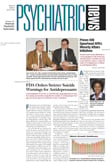Mothers of infants and small children welcome the opportunity to discuss their own mental health with the child’s pediatrician, including the possible need for referral to a specialist. Such a conversation, however, can happen only in the context of a trusting relationship.
Many mothers are fearful of being judged a bad parent if they acknowledge depression or other mental health problems, according to qualitative research published in the March Pediatrics.
“Despite the fact that mothers want to turn to their pediatricians to talk about stress and depression, they fear being judged,” said study co-author Amy Heneghan, M.D., an assistant professor of pediatrics at Case Western Reserve University School of Medicine in Cleveland. “Our research shows how very important it is for the pediatrician and the mother to develop a trusting relationship so that she will have an opportunity to talk about things that cause family stress.”
Forty-four women in seven focus groups of two to 12 members answered questions about parenting stresses, mental health and illness, and ways in which pediatricians might help them address concerns about their own mental health. For many mothers of young children, the pediatrician is the only health professional they see with any regularity, Heneghan said.
Heneghan said the sample was “purposive”—meaning that women responded on their own to an advertised request for mothers to participate in focus groups, and many may have responded because of stresses they were experiencing as parents. The average score on the 29-item Psychiatric Symptom Index for the participating women was 26.3 (scores over 20 reflect risk for depression).
Heneghan told Psychiatric News that women were generally receptive to being referred to a specialist, including a psychiatrist. But she said the women again expressed the need for such a referral to arise out of a trusted relationship.
A striking finding was the antipathy toward involving social workers, because of their association with child protection agencies—a sentiment that was common across all socioeconomic groups but was especially strong among poorer women.
“Mothers in lower-socioeconomic-status groups were particularly fearful of social work intervention, because they believed that primary function of medical social workers is to remove the child from the home rather than to act as a resource for help,” according to the Pediatrics report.
These were among other themes that emerged from the study:
• Mothers believed in the importance of accepting responsibility for monitoring their own well-being and that of their child.
• Mothers expressed the need to share parenting experiences, stressors, and depressive symptoms with someone (most preferred to speak with family or friends rather than with their child’s pediatrician).
• Open communication with a pediatrician who listens well was perceived by mothers in all groups as very important.
• Mothers expressed interest in receiving supportive written communication about parenting stress and depressive symptoms from pediatricians.
Psychiatrist Nada Stotland, M.D., said the attention of pediatricians to the mental health of mothers is key to finding cases of depression.
“They are at the pediatrician’s office anyway, talking about things they care about—whether the baby is sleeping, eating, and growing,” she said. “If they are relatively healthy, they are going to be there much more regularly than they are at any other health care provider’s office. And when a mother’s depression begins to affect her functioning, she will still get that baby to the pediatrician. Certainly, it would be great if women were seeking out a psychiatrist first, but you’re talking about scheduling another appointment. Here you have a population of women at risk already in a doctor’s office.”
At the same time, she wondered how many mothers actually have one consistent pediatrician that they see over a long-enough period to develop the kind of trusting relationship that mothers seek.
“Most people are in HMOs and large clinics, with all sorts of people handling their medical records,” she said. “How would someone develop a trusting relationship?”
For the same reason, she said the concerns expressed by mothers about being judged a bad parent are far from surprising, and especially poignant in light of recent controversies surrounding privacy of medical records (Psychiatric News, April 2).
“We have mandatory reporting laws, and even as we have some kids suffering horrible neglect without the system taking care of them, we also have a system that has taken kids away without good reason,” Stotland said. “The likelihood is small, but the way the human mind works, if the threat is awful enough—and there is nothing more horrible to a parent than losing their child—that fear is going to loom very large.”
Heneghan said her research indicates the need for treatment approaches that view the depressed woman in the context of motherhood and family.
“Mothers with depression think of themselves as mothers first, women second, and depressed third,” Heneghan told Psychiatric News. “We need to think much more expansively about treatments for subclinical and clinical depression that incorporates peer and family support, child and mother support programs, and pharmacologic and cognitive and interpersonal therapies.”
The study was funded by the Robert Wood Johnson Foundation and the Children’s Research Foundation of Rainbow Babies and Children Hospital, Cleveland.
Pediatrics 2004 113 460
